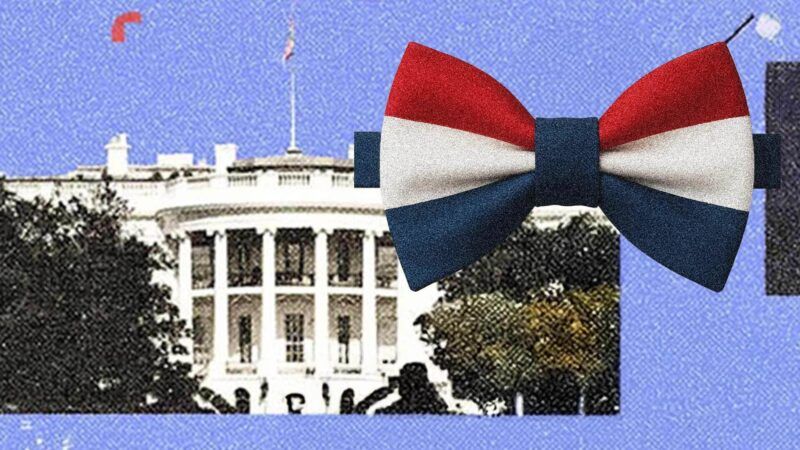'The Only Winner Is the Government,' Says American Bow Tie CEO Facing Higher Tariff Costs
Scenes from a trade war.

One of the supposed goals of the Trump administration's trade policies is to protect and promote American-made products.
Greg Shugar, who owns a business that does make things right here in America, has a hard time seeing it that way.
"I'm charging more and I'm making less," says Shugar, owner of Beau Ties of Vermont, which manufactures neckties, socks, pocket squares, and other fashion accoutrements.
While the vast majority of American clothes and accessories are imported these days, Shugar's company, which employs 18 people, is one of the few that are cutting and sewing those products here in the United States. He told Reason last week that the tariffs have not been a boost for his business. Quite the opposite, in fact, since his products depend on silk jacquard and other materials that are imported from overseas—mostly from China but also from Italy.
Silk jacquard, Shugar explained, is made "from a very specific type of looming machine where they weave silk and it creates more of a stiffer silk, which is what you wear on your ties."
Those machines, however, don't exist in the United States. "You cannot buy silk jacquard anywhere in the U.S.," Shugar told Reason. "So we're forced to buy them overseas. I have no choice."
In that regard, Shugar's business is a lot like many other American-based manufacturers. More than half the imports to the U.S. are raw materials, intermediate parts, or equipment—the stuff that manufacturing firms need to make things, including the silk jacquard that goes into Shugar's ties—rather than finished goods. Tariffs are making those imports more expensive, which in turn makes manufacturing anything in the United States more expensive.
Trump is now doubling down on this policy. On Monday, the president announced new, higher tariffs on imports from Japan, South Korea, and a dozen other countries, mostly in Asia. The cost of those tariffs will fall on American consumers and American manufacturers, like Beau Ties of Vermont. Making it more expensive to make things in the U.S. will end up encouraging more offshoring, not less, Shugar predicts.
His solution? Cut all tariffs on intermediate goods and raw materials used by American-based manufacturers. He's even drafted a one-page bill that he shared with members of Congress during a recent visit to Washington, D.C., that would exempt American companies from tariffs on the materials they purchase.
That's a somewhat self-interested proposal, of course. It would leave higher tariffs on finished products—like the imported ties and other accessories that Shugar's company is competing against—while giving a tax break to American manufacturers.
Still, that makes more sense than the Trump administration's blanket tariffs, which are not producing the manufacturing boom the president supposedly wants. In the face of higher prices created by the tariffs, the White House has offered few solutions other than telling businesses to "eat" the added cost.
In the meantime, Shugar says he is doing that when he can and passing along some of the cost to his customers.
"My gross margins are down because we're eating some, but I'm not eating everything. So I raised prices. So now my customers have to pay higher on some items," Shugar told Reason. "The only winner is the government, who collects a higher tariff bill."


Show Comments (41)